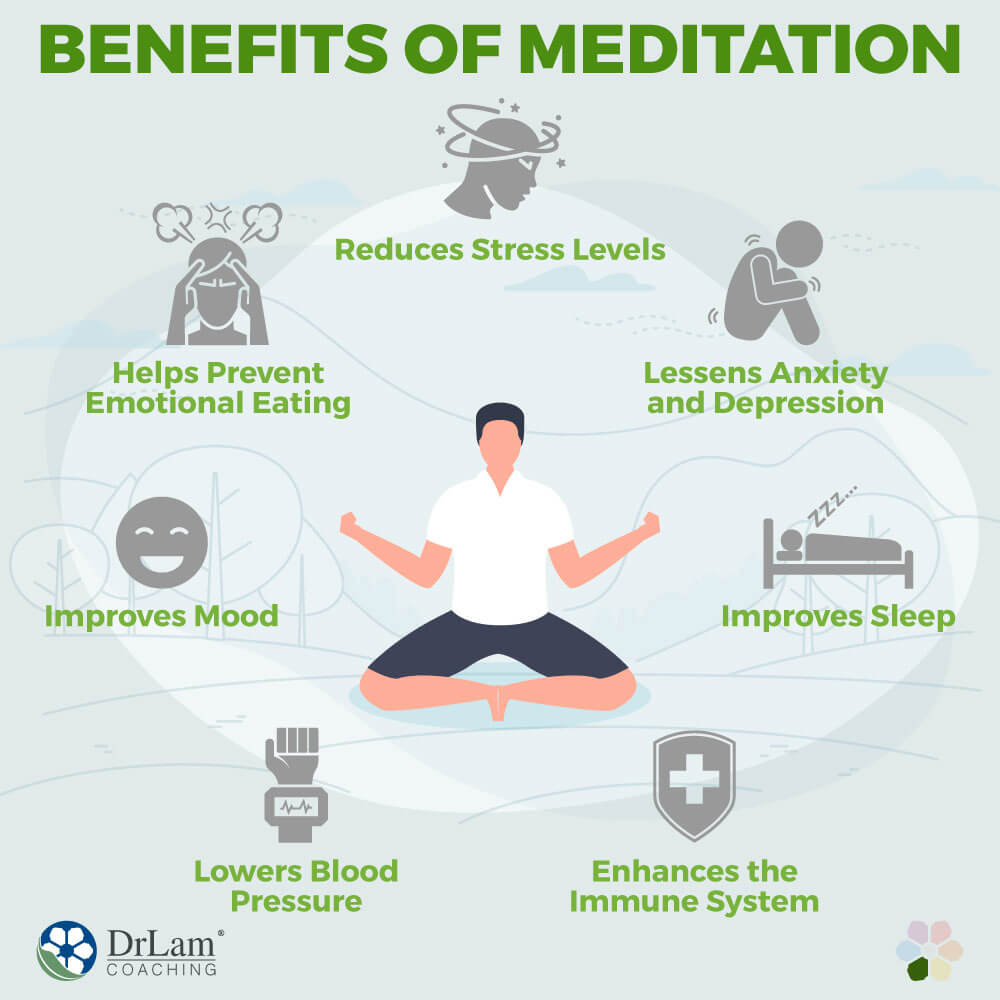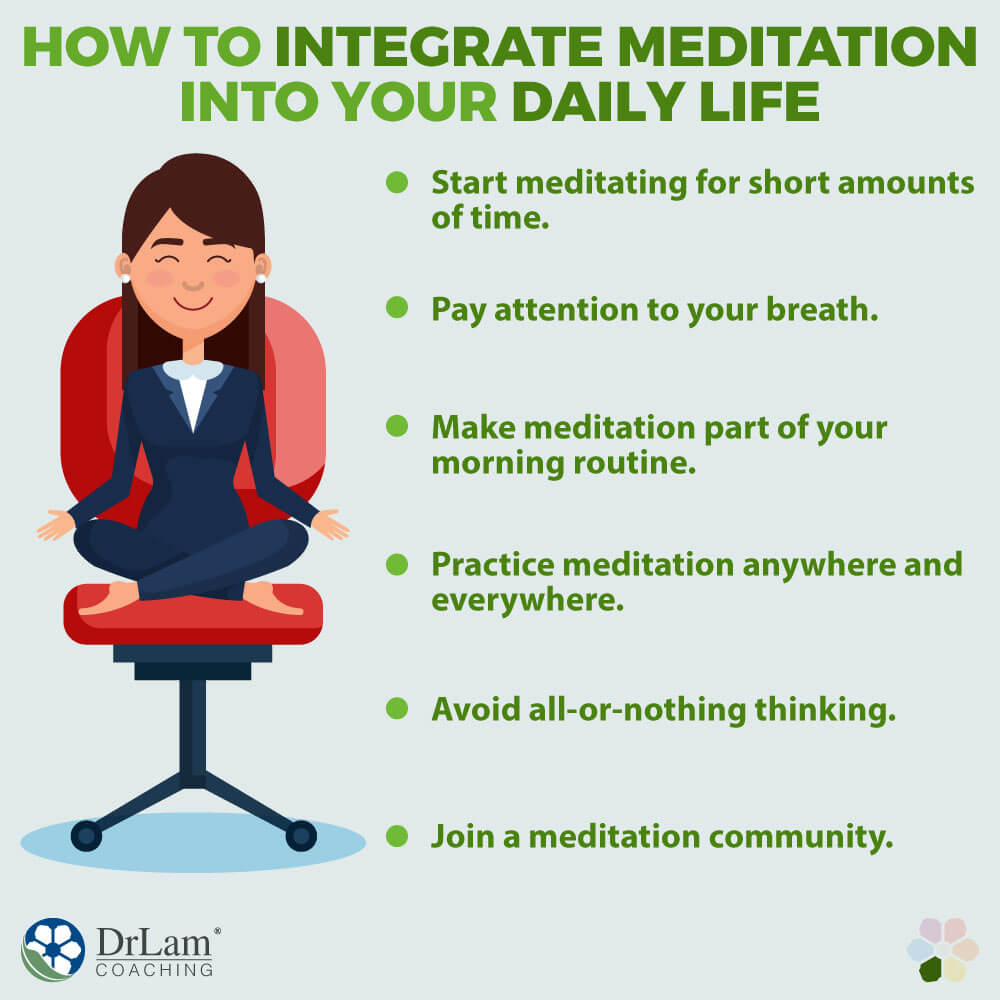 Stress can occur so often that it may seem like a state of being. And the more often you feel stressed, the more damage it does to your body. When your body has no time to rest and repair, even basic functions can go awry. To keep stress from ruining your health, you need to learn to address stress before it becomes worse. One way to do this is through major lifestyle changes. Eating better, exercising, and getting more sleep can help. But mindfulness is something you can do in the midst of stress. And this can be achieved with the help of meditation. What's more, the benefits from meditation include reduced stress, anxiety, and depression levels.
Stress can occur so often that it may seem like a state of being. And the more often you feel stressed, the more damage it does to your body. When your body has no time to rest and repair, even basic functions can go awry. To keep stress from ruining your health, you need to learn to address stress before it becomes worse. One way to do this is through major lifestyle changes. Eating better, exercising, and getting more sleep can help. But mindfulness is something you can do in the midst of stress. And this can be achieved with the help of meditation. What's more, the benefits from meditation include reduced stress, anxiety, and depression levels.
Meditation is a practice or set of techniques that are meant to heighten your state of awareness and improve your focused attention. Unlike other practices, meditation does not rely on any type of hypnosis or medication to work. Instead, it encourages you to make changes in your consciousness so that you can calm your body, rest your mind, increase your awareness, and experience the full benefits from meditation.
Meditation is a process of transforming the mind. Hence, meditation practices often involve techniques that encourage deep concentration, emotional positiveness, calm, and clarity. The goal is to cultivate more positive ways to live and develop profound peace from within while energizing the mind.
Typically, there are two ways that meditation can be done. First is the concentrative form of meditation. Here, you focus your attention on a single object, such as the breath or a visualization, and allow distracting thoughts to pass. The other type of meditation involves being mindful and aware of your thoughts as they pass, avoiding judgment or worrying too much about any one thought.
Meditation has many benefits for reducing stress in your life and improving your ability to cope with the stress that is already there. But to best understand its benefits, it’s important to first understand how stress affects your body.
When the body encounters stress, it relies on its NeuroEndoMetabolic (NEM) Stress Response system. The NEM stress response system is made up of six circuits, units of organs and systems, in the body that work interdependently to cope with stress. It is this system that initiates the fight or flight response, shutting down some systems and increasing others to prepare your body to react.
The neuroaffect circuit is particularly connected to the benefits of meditation. It is composed of the central nervous system (CNS), autonomic nervous system (ANS), and the gastrointestinal (GI) system. All of these systems rely on neurotransmitters to maintain balance in the body and mood.
Once the stressful episode has passed, the body systems that play a role in the NEM stress response return to normal function, allowing the body to reactivate rest and repair functions like digestion or sleep. However, if stress is persistent, systems remain in high gear, ready to run or fight, and while repair functions languish, others become severely overworked.
At the same time, the body also begins to experience an over-activation of neurotransmitters. For example, the neurotransmitter norepinephrine typically supports alertness within the CNS. But when there’s an over-activation of this neurotransmitter, insomnia, panic attacks, and anxiety can result. An overworked neuroaffective response may also cause an over-activation in the ANS, causing you to feel sudden heart pounding. Dysregulation of this circuit can also lead to severe sleep disturbance, preventing you from experiencing restful sleep.
 Increased production of the neurotransmitter adrenaline from the adrenal glands in the hormonal circuit leads to faster breathing, tense muscles, and sweating. The adrenals also produce more of the hormone cortisol, the body’s primary stress hormone. This leads to neurotransmitter dysregulation and a significant hormonal imbalance. Eventually, chronic stress can trigger Adrenal Fatigue Syndrome (AFS). Adrenal fatigue can lead to many uncomfortable symptoms that worsen over time.
Increased production of the neurotransmitter adrenaline from the adrenal glands in the hormonal circuit leads to faster breathing, tense muscles, and sweating. The adrenals also produce more of the hormone cortisol, the body’s primary stress hormone. This leads to neurotransmitter dysregulation and a significant hormonal imbalance. Eventually, chronic stress can trigger Adrenal Fatigue Syndrome (AFS). Adrenal fatigue can lead to many uncomfortable symptoms that worsen over time.
Fortunately, the benefits from meditation will allow your body to address many of the problems associated with chronic stress, and help your body begin to rest and repair itself.

Indeed, one of the most important benefits from meditation is that it can help the body calm itself and stop stressing. Because of this, you are also at less risk for developing adrenal fatigue. If you already have adrenal fatigue, regular meditation practice can also aid in adrenal recovery.
Here are some of the key benefits from meditation for addressing chronic stress and relieving adrenal fatigue:
Practicing meditation regularly has been found to reduce one’s stress levels significantly. A study from the Shamatha Project found that participants in a meditation retreat for three months had lower evening levels of cortisol. In contrast, high levels of cortisol are typically associated with significant emotional or physical stress. Retreat participants who also saw an increase in their mindfulness score ended up having lower cortisol levels.
 Constant stress can cause anxiety and a lot of worrying. Eventually, it can also trigger loneliness and even depression. Fortunately, these can both be managed with meditation. A study in the Journal of Clinical Psychiatry found that mindfulness meditation can lead to significant reductions in distress and anxiety ratings. Meditation has also been found to be effective for mothers showing depression symptoms.
Constant stress can cause anxiety and a lot of worrying. Eventually, it can also trigger loneliness and even depression. Fortunately, these can both be managed with meditation. A study in the Journal of Clinical Psychiatry found that mindfulness meditation can lead to significant reductions in distress and anxiety ratings. Meditation has also been found to be effective for mothers showing depression symptoms.
Meditation has been found to help improve your mood. One study found people who participated in a meditation training experienced improved their psychological well-being. A study in Philadelphia observed significant improvement in anxiety and mood parameters among patients with memory loss who underwent a meditation program for eight weeks.
When there is inflammation in the body as a result of stress, toxins can enter the body more easily through the gut lining. As a result, the immune system is in constant alert fighting toxins and eventually weakens significantly. With regular meditation, the body is able to rest and repair itself so immune function can be restored. A study in the Psychosomatic Medicine journal found that a short mindfulness meditation program can have a significant effect on one’s immune function. Moreover, mindfulness meditation can improve one’s immune function and even enhance cognitive function.
When the body is in a state of constant stress, it is common to experience high blood pressure. Over time, this can weaken and damage your blood vessels, causing them to leak or rupture, leading to stroke or heart problems. One of the best ways to lower blood pressure is through regular meditation. In fact, a study in Kentucky found that transcendental meditation can effectively control high blood pressure.
People with advanced adrenal fatigue often experience disrupted sleep. This insomnia can be due to a number of triggers including hormonal imbalance, sympathetic overtone, metabolic issues, and neurotransmitter dysregulation. This can make adrenal recovery much more difficult. By practicing meditation regularly, however, your sleep quality can be improved significantly.
In fact, a study in New Jersey showed that meditation practitioners experienced an average increase of 98 percent in their melatonin levels. This is the powerful neurochemical that is critical for sleep. Another study published in the JAMA Internal Medicine journal found that practicing meditation is a more effective way to relieve sleep disturbances than undergoing a sleep hygiene education program.
Stress can lead to emotional eating, which besides adding unhealthy foods to your diet can eventually lead to obesity and other associated conditions such as heart disease. However, a study in Chicago found that mindfulness meditation can help reduce both binge eating and emotional eating habits. By reducing stress and paying more attention to your body’s needs and your emotions, you are better able to say no to that bag of chips.

Now that you know more about the benefits from meditation for soothing stress, healing your body, calming your mind, and reducing adrenal fatigue, it’s time to get some ideas for how to meditate.
These tips can help you get started practicing meditation on your own:
 You don’t have to meditate for long periods of time to experience benefits from meditation. Even a few minutes of meditation practice a day is a beneficial habit. Trying to sit and figure out what to focus on for too long can be frustrating or overwhelming at first. However, as you learn to sit calmly and allow your mind to rest, over time, it will be easier to sit for longer. And even just taking a few deep breaths at stop lights, for example, counts as meditation and can help turn your mood around.
You don’t have to meditate for long periods of time to experience benefits from meditation. Even a few minutes of meditation practice a day is a beneficial habit. Trying to sit and figure out what to focus on for too long can be frustrating or overwhelming at first. However, as you learn to sit calmly and allow your mind to rest, over time, it will be easier to sit for longer. And even just taking a few deep breaths at stop lights, for example, counts as meditation and can help turn your mood around.
You breathe all the time, but being conscious of your breathing, all the way in and all the way out, can be a challenge. Many meditation practices rest on just being aware of your breath, without trying to breathe in any special way. Allowing your mind to focus on this, and not worrying if you get distracted, just returning your focus to the breath, can have huge health benefits.
Notice your breath coming in; notice where you feel it in your body as it makes its way through your nose or mouth, down your throat, and into your lungs. See if you can notice where it turns, and you begin breathing out. Then, as you exhale, notice how the breath feels in your body, and imagine the stress blowing away. It may help to count each in and out breath, up to ten, and then start over.
Doing some meditation in the morning can help start your day right. It boosts good chemicals in your brain, makes you want to wake up, and makes you a calmer and more relaxed person when you arrive at work or school. Having a set time also helps remind you to meditate, and it gives you a quiet time to sit.
You don't need a private room or absolute silence to do effective meditation. You can practice mindfulness just about anywhere and experience benefits from meditation. Do a short meditation while you're on a cab, train or bus to work. You can even do a short meditation while you are out taking a stroll. Make your movement, noises, or distractions part of the meditation, and return your focus to your breath. Especially if you are feeling particularly stressed out, take the time to meditate no matter where you are.
In the beginning, you may find it rather difficult to commit to mindfulness practice every day. However, don’t be hard on yourself. Any number of times that you can do meditation help with stress relief. Meditation is all about starting over, in each moment, with noticing your breath and where you are. If you can’t do it, that’s fine. Just start over, in the next moment, when you can.
Moreover, all-or-nothing thinking simply contributes to more internal pressure. This, in turn, causes further stress which can prevent you from achieving peace.
 For some people, practicing meditation on their own can be rather difficult. In this case, it may be better to join a meditation community. Here, you can get guided meditations, tips, that help track your progress. There are also several apps and online groups dedicated to teaching meditation techniques and providing support as you learn this new skill.
For some people, practicing meditation on their own can be rather difficult. In this case, it may be better to join a meditation community. Here, you can get guided meditations, tips, that help track your progress. There are also several apps and online groups dedicated to teaching meditation techniques and providing support as you learn this new skill.
As long as you are able to do some meditation regularly, your body will begin to experience the benefits from meditation for reducing stress. In the space of a few breaths, you can feel calmer and more relaxed.
© Copyright 2014-2019 Michael Lam, M.D. All Rights Reserved.
One of the primary benefits from meditation is significant stress reduction. Studies have shown that mindfulness practice can help manage various effects of stress, which include high blood pressure, anxiety, worrying, depression, and insomnia.

